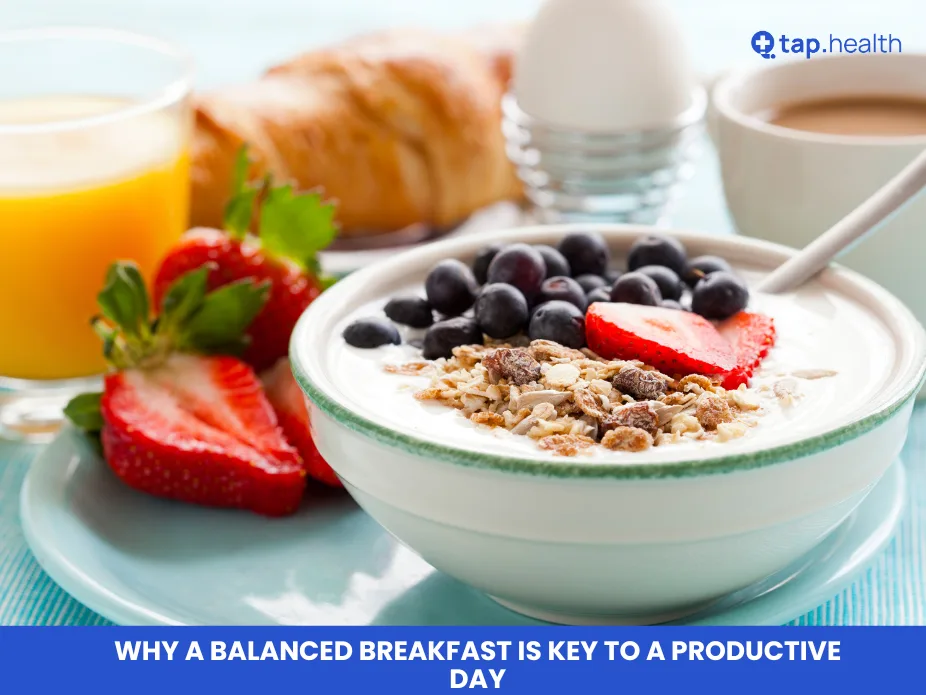Starting your day with a balanced breakfast is one of the simplest yet most effective ways to set yourself up for success. Breakfast provides the energy and nutrients your body needs to function optimally. Yet, in the hustle and bustle of daily life, many people tend to skip this crucial meal or opt for unhealthy choices. The impact of such habits on productivity can be significant. In this article, we’ll explore why a balanced breakfast is essential for maintaining high energy levels, improving cognitive function, and ensuring overall health throughout the day.
The Power of Breakfast: A Nutritional Overview
Breakfast is the first meal you consume after fasting overnight, and it plays a pivotal role in providing the nutrients your body needs to start the day. A balanced breakfast typically includes a combination of carbohydrates, protein, healthy fats, and fiber. Each of these macronutrients has distinct roles in boosting energy and supporting brain function:
- Carbohydrates: The body’s primary source of energy, carbs are broken down into glucose, which fuels the brain and muscles.
- Protein: Helps repair tissues and build muscles while keeping you feeling full longer, preventing mid-morning hunger.
- Healthy Fats: Essential for brain health, fats also provide long-lasting energy.
- Fiber: Supports digestive health and helps regulate blood sugar levels.
When you consume a balanced breakfast, you ensure that your body has the necessary fuel to perform at its best.
Real-Life Scenarios
Consider two individuals, Alex and Sarah, who start their workday in very different ways.
- Alex skips breakfast altogether, opting for a cup of coffee as his sole source of morning fuel. By mid-morning, he begins to feel sluggish, with low energy levels and difficulty concentrating. His productivity declines, and he ends up eating a large, unhealthy lunch to compensate.
- Sarah, on the other hand, starts her day with a balanced breakfast that includes whole-grain toast, scrambled eggs, avocado, and a side of fruit. By mid-morning, she feels energized and focused, maintaining a steady level of concentration throughout the day. Her productivity remains high, and she avoids the afternoon energy slump.
These real-life scenarios illustrate the stark contrast between the outcomes of skipping breakfast versus choosing a balanced one. A nutritious breakfast, like Sarah’s, provides sustained energy and helps keep focus, leading to greater productivity and improved mood throughout the day.
Expert Contributions
Experts in nutrition and health consistently emphasize the importance of breakfast for both physical and mental well-being. According to Dr. John Barban, a nutrition expert, “Breakfast is crucial because it provides your body with the essential nutrients it needs to operate at its peak. Skipping it can lead to poor concentration, fatigue, and overeating later in the day.”
Dr. Kelly Ann Mills, a psychologist specializing in cognitive health, agrees: “The brain requires glucose to function effectively, and a balanced breakfast helps provide this steady supply. Skipping breakfast often leads to a dip in blood sugar levels, which can negatively affect mood and cognitive performance.”
Research supports these claims, showing that breakfast consumption is linked to improved cognitive function, better memory, and greater attention span. This is especially true for individuals who choose whole, nutrient-dense foods in the morning.
Recommendations Grounded in Proven Research and Facts
- Incorporate Protein and Fiber: According to a study published in The American Journal of Clinical Nutrition, individuals who consumed a high-protein, high-fiber breakfast experienced reduced hunger throughout the day and showed greater cognitive performance compared to those who consumed a sugary breakfast. A balanced breakfast might include eggs, Greek yogurt, whole grains, and vegetables.
- Avoid Sugary Foods: A sugary breakfast, such as a sugary cereal or pastries, may give you a quick energy boost but can lead to a crash later on. Studies show that high sugar consumption in the morning is associated with increased risk of weight gain and insulin resistance.
- Don’t Skip Breakfast: According to a report from the Harvard T.H. Chan School of Public Health, skipping breakfast can disrupt metabolism and increase the risk of developing conditions like type 2 diabetes, obesity, and heart disease. Eating a nutritious breakfast helps keep blood sugar levels stable, which can help you stay energized and focused.
- Include Healthy Fats: Omega-3 fatty acids, found in foods like walnuts, chia seeds, and flaxseeds, are essential for brain health. Including these in your breakfast can support cognitive function and keep you sharp throughout the day.
- Stay Hydrated: Dehydration can lead to fatigue and reduced cognitive function. Drinking water or herbal teas alongside your breakfast can help maintain hydration levels.
Factual and Reliable Information
The scientific community agrees that breakfast is not just a matter of tradition but a key element of a productive and healthy lifestyle. Studies have consistently shown that eating a balanced breakfast can improve focus, memory, and overall cognitive performance. A study conducted by the Journal of Nutritional Science and Vitaminology found that people who ate breakfast had better cognitive performance and were more productive throughout the day.
Another study published in Appetite indicated that people who ate breakfast were less likely to overeat at lunch, making healthier food choices overall. This is crucial because overeating can lead to the dreaded afternoon slump, reducing your ability to perform tasks efficiently.
How Breakfast Affects Productivity
The positive impact of a balanced breakfast on productivity is well-documented. When you eat a nutritious breakfast, your body’s glucose levels remain stable. This is vital for brain function, as the brain uses glucose as its primary source of fuel. Low blood sugar levels can impair concentration, cause irritability, and reduce overall productivity.
In contrast, consuming a balanced meal that includes protein, fiber, and healthy fats ensures a slow release of energy throughout the day, promoting sustained focus and reducing the likelihood of energy crashes.
Additionally, eating breakfast can improve mood and mental well-being. A study conducted by the National Institutes of Health found that individuals who consumed a balanced breakfast reported improved mood and a greater sense of well-being compared to those who skipped breakfast.
FAQs About a Balanced Breakfast and Productivity
Q1: Can skipping breakfast affect my productivity?
Yes, skipping breakfast can lead to decreased energy levels, reduced focus, and poor mood, which all negatively impact productivity.
Q2: What should a balanced breakfast include?
A balanced breakfast should contain protein (like eggs or yogurt), fiber (such as fruits or whole grains), healthy fats (like avocado or nuts), and carbohydrates (such as oats or whole-grain bread).
Q3: Can a sugary breakfast improve productivity?
While a sugary breakfast may provide a quick energy boost, it can lead to a crash later in the day, resulting in reduced focus and productivity. A balanced breakfast is a better option for sustained energy.
Q4: How can a balanced breakfast impact my mood?
A balanced breakfast can stabilize blood sugar levels, which in turn helps maintain mood and mental well-being, preventing irritability and mood swings.
Q5: Is it better to eat a large breakfast or a smaller one?
It depends on your personal preference and daily routine. However, a moderate-sized, balanced breakfast that includes a combination of protein, fiber, and healthy fats is generally recommended for sustained energy and focus.
Conclusion
Incorporating a balanced breakfast into your daily routine is one of the easiest and most effective ways to set yourself up for a productive and successful day. By providing your body with the essential nutrients it needs, you can enhance your cognitive function, boost energy levels, and maintain a positive mood. Whether you’re working, studying, or engaging in other daily tasks, a nutritious breakfast can make all the difference in achieving optimal performance. Remember, a small change in your morning routine can lead to significant improvements in your overall well-being and productivity.
Sources:
- Harvard T.H. Chan School of Public Health: Breakfast and Health
- National Institutes of Health: Breakfast and Mood



